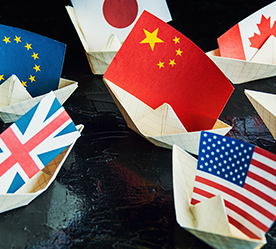FDF members: Sign in to see full content
The FDF informs the Government’s international trade policy priorities and provides advice to its members on trade and customs issues.
The FDF also offers further information to guide your company on issues arising as a result of changing terms of trade as the UK Government seeks to negotiate new trade agreements with countries and territories around the world.
Latest updates
The Border Target Operating Model: changes to future UK border controls
The government has now published the final version of the Border Target Operating Model (BTOM). The key changes to the final version are the revised dates on the introduction of certification and check requirements for EU imports:
- 31 Jan 2024: the introduction of certification requirements on imports from the EU
- 30 April 2024: documentary and risk-based identity and physical checks on medium-risk products and on high-risk food and feed of non-animal origin imports from the EU
9 May Update: Defra have confirmed that the risk review of EU composite products initially scheduled for April has not yet taken place. They also confirmed that they are not looking to make immediate changes to the categorisation, except for exceptional circumstances e.g. a disease outbreak. Defra have also stated industry will be provided with 6 months notice for any changes that occur.
Key documents that we have produced for FDF members are available here:
FDF Trade Snapshot Q1 2024: Export volume declines
The FDF Q1 trade snapshot finds that exports between January and March 2024 have fallen by 5.3% year on year. Export volumes saw a significant decline with products measured in kilograms down by over a fifth on the year. This report also looks at trade with Turkey and the Gulf Cooperation Council.
The Windsor Framework: what does it mean for UK food and drink?
The Windsor Framework sets out updated processes for movements of goods from Great Britain (GB) into Northern Ireland (NI).
Key documents that we have produced for FDF members are available here:
FDF overview of the Windsor Framework
FDF Windsor Framework issues tracker
FDF Navigating the Windsor Framework slides
GB-wide 'Not for EU' labelling: Consultation response
Defra have shared two letters with industry on enforcement and compliance. The first letter covers the overall approach in the initial months of the scheme with the second letter focusing on further exceptions to box level labelling requirements and conditions for moving Rest of World (Non-UK/EU goods).
Next steps
|
NI Retail Movement Scheme |
UK Internal Market Scheme |
|
1 October 2024: Product-level labelling extended to dairy products. At this stage, product level labelling is proposed to apply on a UK-wide basis July 2025: Product-level labelling extended to some composite products, fruit, vegetables, fish and pet food and all further goods subject to controls at EU BCPs |
1 October 2024: Full deployment of Customs Green Lane
|
Related topics

Border policy
Our priorities to deliver world leading borders and customs to support the growth of UK food and drink manufacturing.

Trade policy
Our priorities for UK trade policy, including our trade and investment strategy and detailed positions on live negotiations.
Report: Trade Snapshot: Full Year 2021
18 March 2022
The FDF’s newly released 2021 Trade Snapshot analyses trends for UK food and drink trade in 2021.
Read moreReport: Eating into household budgets: the Government’s recipe for food price inflation
20 July 2021
This report looks at the impact UK Government policies will have on food prices for both our food and drink manufacturing businesses and our household shopping baskets across the UK.
Read moreWebinar: The future of imports: what you need to do to keep your goods moving
10 September 2021
Listen to this webinar for a full insight into the future of imports from the EU into the UK and what key guidance you need to know in order to continue trading without friction.
Read more